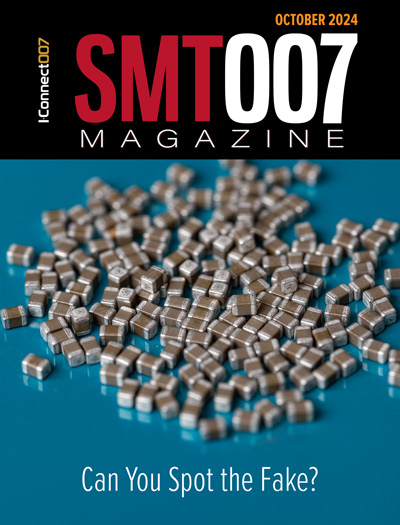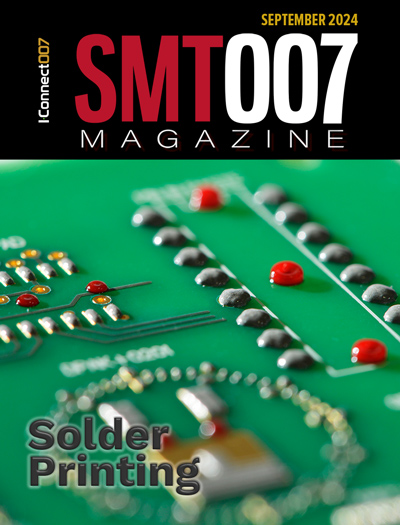-

- News
- Books
Featured Books
- smt007 Magazine
Latest Issues
Current Issue
The Rise of Data
Analytics is a given in this industry, but the threshold is changing. If you think you're too small to invest in analytics, you may need to reconsider. So how do you do analytics better? What are the new tools, and how do you get started?

Counterfeit Concerns
The distribution of counterfeit parts has become much more sophisticated in the past decade, and there's no reason to believe that trend is going to be stopping any time soon. What might crop up in the near future?

Solder Printing
In this issue, we turn a discerning eye to solder paste printing. As apertures shrink, and the requirement for multiple thicknesses of paste on the same board becomes more commonplace, consistently and accurately applying paste becomes ever more challenging.
- Articles
- Columns
Search Console
- Links
- Media kit
||| MENU - smt007 Magazine
New Center to Improve Robot Dexterity Selected to Receive Up to $52M
August 21, 2024 | Northwestern UniversityEstimated reading time: 4 minutes
A large multi-institutional collaboration, led by Northwestern University, has received $26 million from the National Science Foundation (NSF) to launch a new Engineering Research Center (ERC) dedicated to revolutionizing the ability of robots to amplify human labor.
The NSF grant will fund the new center across five years, with the ability to renew for another $26 million for an additional five years. It marks the first ERC led by Northwestern. Core partners include Carnegie Mellon University, Florida A&M and Texas A&M with additional faculty support from Syracuse University, the University of Wisconsin-Madison and the Massachusetts Institute of Technology.
Called Human AugmentatioN via Dexterity (HAND), the new ERC will develop dexterous robot hands with the ability to assist humans with manufacturing, caregiving, handling precious or dangerous materials and more. The center aims to build technological tools that are versatile and easy-to-integrate, creating robots capable of intelligent and versatile grasping, fine motor skills and hand-eye coordination.
“This new NSF award is a historic milestone that builds on Northwestern’s well-recognized expertise in robotics and human-machine systems,” Eric Perreault, Northwestern’s vice president for research. “The HAND proposal is bold and visionary. It will have a long-lasting, positive effect on manufacturing, food processing, healthcare and many other areas that rely on dexterous manipulation. Ed Colgate, Kevin Lynch and their exceptional colleagues across Northwestern have built a world-class team of industrial and academic partners to ensure this cutting-edge research creates practical outcomes. I look forward to witnessing the transformative impact it will bring."
An expert in robots and haptics, J. Edward Colgate, a Walter P. Murphy Professor of Mechanical Engineering at Northwestern’s McCormick School of Engineering, will lead the center. Kevin Lynch, a professor of mechanical engineering at McCormick and director of Northwestern’s Center for Robotics and Biosystems, will serve as the center’s research director. Other Northwestern collaborators include McCormick’s Brenna Argall, Jian Cao, Matthew Elwin, Elizabeth Gerber, Todd Murphey and Ryan Truby and the School of Education and Social Policy’s Lois Trautvetter.
“Northwestern has long strived to provide national leadership in areas of the greatest societal and economic importance,” said Chris Schuh, dean of the McCormick School of Engineering. “The HAND ERC does just that, delivering a broad innovation ecosystem, united in purpose and mission, to realize robot dexterity. I am grateful for Ed’s tremendous leadership of this initiative and am excited to see the advancement in robotics that will come from this work.”
While robots already play an important role in manufacturing and can improve workers’ job quality and raise their wages, Colgate says their full potential has been limited. Developing robotic hands that are as versatile and dexterous as human hands will enable robots to expand human capabilities and boost industry competitiveness.
“Rapid advances in artificial intelligence (AI) have created an incredible opportunity to make robot manipulators accessible to small American manufacturers, people with motor impairments and many others who might benefit,” Colgate said. “A huge challenge, however, is what we put at the end of the robot’s arm. Today’s two-jaw grippers are far too limited. HAND’s fundamental research will lead to robots with dexterous and versatile hands, manual skills and intuitive interfaces that anyone can learn to use.”
But dexterity isn’t the new center’s only goal. The researchers also want to ensure new robotic hands are inexpensive, easy to operate without expertise, robust, durable and mass-manufacturable. As a part of the center, robotics and technology researchers will work across disciplines to engage experts in education, policy, accessibility and diversity, equity and inclusion.
The interdisciplinary team will help develop and prepare a diverse workforce for an entirely new field of study focused on dexterous robots and foster a culture that nourishes inclusivity and ensures equitable access to new technologies. Potential outcomes will include increased worker productivity, improved job opportunities, reshoring of manufacturing, reduced supply chain vulnerability, enhanced food safety, improved quality of life and democratization of the benefits of robotics.
Since its founding in 1985, the ERC program has supported convergent research, education and technology translation at U.S. universities. Each ERC unites members from academia, industry and government to produce transformational engineered systems along with engineering graduates who are adept at innovation and primed for leadership in the global economy.
"NSF's Engineering Research Centers ask big questions in order to catalyze solutions with far-reaching impacts," said NSF Director Sethuraman Panchanathan. "NSF Engineering Research Centers are powerhouses of discovery and innovation, bringing America's great engineering minds to bear on our toughest challenges. By collaborating with industry and training the workforce of the future, ERCs create an innovation ecosystem that can accelerate engineering innovations, producing tremendous economic and societal benefits for the nation."
Suggested Items
Root-cause Analysis and Problem-solving
11/01/2024 | Happy Holden, I-Connect007An essential skill for any process engineer in printed circuit fabrication is the ability to conduct root-cause analysis (RCA) and problem-solving. These are related to TQC and Six Sigma applications and are essential for customer support and continued profitability. All engineers will encounter these methods sooner or later, but it will likely be sooner if you are in product or process engineering in manufacturing.
2024 Charles Hutchins Educational Grant Winner Announced
11/01/2024 | SMTASMTA is honored to announce G. Çağatay Özşeker, a graduate student at Northeastern University, has been selected as the winner of the 2024 Charles Hutchins Educational Grant.
SAIC, Wind River Expand Strategic Partnership to Accelerate Development and Deployment of Mission-Critical Systems
10/22/2024 | SAICScience Applications International Corp. and Wind River® have announced an expanded strategic partnership to deliver industry-leading technologies to government customers by easing mission-oriented integration, speeding development and enhancing functionality in systems, for the U.S. Army and other government entities, including Cabinet-level departments and independent agencies.
CACI Awarded $805 Million Task Order to Provide Engineering Support and Technology to U.S. Navy’s NavalX Office
10/22/2024 | CACI International Inc.CACI International Inc announced that it has been awarded a five-year task order valued at up to $805 million to provide engineering support and technology to the U.S. Navy’s NavalX Office under the Department of Defense Information Analysis Center’s (DoD IAC) multiple-award contract (MAC) vehicle.
Altair Drives Aerospace Innovation at Motivo
10/17/2024 | AltairAltair, a global leader in computational intelligence, is proud to announce its collaboration with Motivo, a product engineering firm focused on translating forward-thinking visions into best-in-class products for clients in the mobility, energy, agriculture technology, and aerospace sectors. Motivo utilizes Altair’s unique combination of engineering consulting and software to drive innovation for organizations in the aerospace industry.


